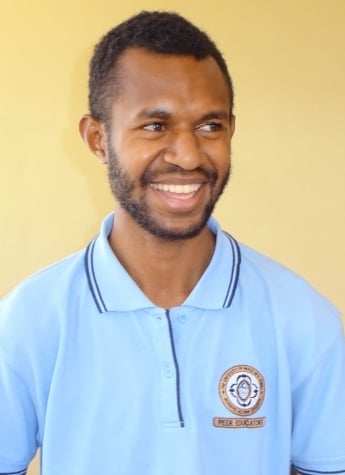FIJI, Pacific/PORT MORESBY, Papua New Guinea – Despite a childhood punctuated by ethnic clashes in a squatter settlement in Papua New Guinea, a discussion with Benaiah Nari quickly makes it clear that he is ready to challenge the status quo. This is especially true when it comes to changing his peers’ mentality towards sexual and reproductive health and rights.
In a country where more than half of the population is under the age of 25, this can have an invaluable impact on sustainable development.

“I grew up in a squatter settlement where I was engaged in a lot of stuff harmful to me as a young person, but I was determined to change the course of my life and that’s how I ended up in university,” said Nari, 24, in an interview during the latest Conference of Small Island Developing States in Apia, Samoa.
Nari’s participation in the conference was funded by UNFPA because of his peer education work at the University of Papua New Guinea (UPNG), where he is currently enrolled in his second bachelor’s degree.
Tackling multiple challenges
In the Pacific region, Papua New Guinea (PNG) is a relative giant with 600 associated islands, 800 languages and a population of 7.3 million.
Among the many challenges the country faces today, gender inequality is a serious concern with systematic violations of women’s rights persisting throughout the country. According to recent population and development figures from the Pacific Islands, PNG ranks in the bottom fifteen on the Gender Inequality Index.
The country also records 733 maternal deaths for every 100,000 live births, and has the highest HIV prevalence rates among Pacific island countries in the region.
But Papua New Guineans have not taken these challenges lying down.
During the 1990’s, the UPNG created a peer education programme as an innovative way of empowering young people to make healthy and safe sexual and reproductive health choices.
Supported by UNFPA and Marie Stopes International, the programme was created in response to alarming rates of sexually transmitted infections and various cases of sexual abuse and violence among the student body.
Nearly 20 years later, Nari bears witness to its benefits. But despite progress on campus, he still expresses concerns about the current state of sexual and reproductive health in the country overall.
Speaking openly and honestly
“Talking about sex in PNG is one of the main challenges, it is not something we discuss openly and our work has led to perceptions that we encourage sex,” Nari explains. “But once students realize that it is really about saving lives and safeguarding their future, they come for contraceptives.”
Nari first attended a peer education session at the university in 2010, out of curiosity, but the story hit home.
“I could relate to what they were talking about: I came from there,” he says. “I had experienced what they were talking about and I wanted to get involved.”
Nari is part of a dynamic team that raises awareness about sexual and reproductive health and rights across the student residential halls on campus. When necessary, the more complex medical questions are referred to external partners with the appropriate expertise.
Guided by alumni peer educators, activities include performing arts sessions like poetry slams and theatre productions, as well as sporting events.
“Healthy Mind, Healthy Body, Healthy Sexuality”
One such initiative, the H3MBS Games, is fast becoming one of the most popular activities on campus. Organized annually, the event features teams competing in football, basketball and volleyball, united under the tournament’s “Three Hs” motto: Healthy Mind, Healthy Body and Healthy Sexuality.
The impact is already being felt on campus.
“There are a lot less people coming to see us about unplanned pregnancy, and the university security officials say there is much less vandalism or fighting, especially when we carry out our activities consistently,” says Nari.
Almost 75 per cent of graduates who are peer educators go on to management positions, he notes, so the lessons are also making their way into the country’s future workforce.
“We start small, but as long as we keep it going […] the investment in this programme is actually making a difference and that makes me more determined to continue.”


